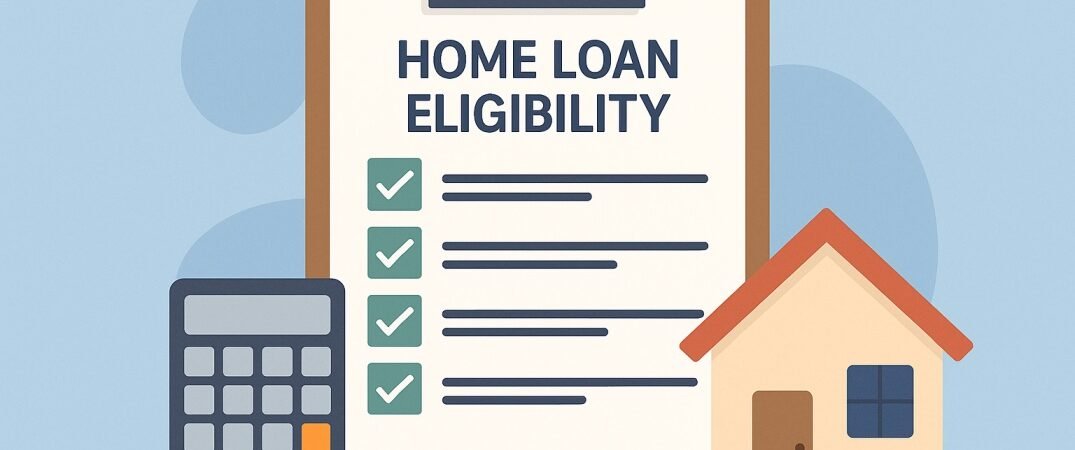If you’re planning to buy a house in India, chances are you’ll need a home loan to fund the purchase.
But before you walk into a bank or click “Apply Now” online, it’s important to know whether you’re even eligible.
Banks and housing finance companies in India use strict parameters to assess your loan eligibility.
In this post, we’ll walk you through the complete eligibility criteria for a home loan, key documents, and tips to improve your chances.
✅ Why Home Loan Eligibility Matters
A lender won’t just approve your loan because you want a home.
They look at your financial stability, income, credit history, and property details to decide how much loan they can safely give you — and on what terms.
If you fall short on eligibility, your loan may be:
- Rejected, or
- Approved for a lower amount, or
- Charged a higher interest rate
📋 Key Eligibility Criteria for Home Loan in India
1️⃣ Age Limit
- Minimum Age: 21 years
- Maximum Age: 60 years (salaried), 65 years (self-employed)
📝 The younger you are, the longer tenure you can get, reducing EMI burden.
2️⃣ Employment Type and Stability
- Salaried: Must be employed for at least 2–3 years, with current job stable
- Self-Employed: Business or professional income must be consistent for 3+ years
⚖️ Lenders look for income continuity, not just high income.
3️⃣ Monthly Income
There’s no fixed rule, but most banks expect:
- Minimum ₹25,000/month income in metro cities
- Higher income needed for bigger loans
💡 EMI-to-Income ratio should ideally not exceed 40%–50% of net monthly income.
4️⃣ Credit Score
- Minimum required: Usually 700 or above
- Excellent score: 750+
A good score gets you:
- Faster approvals
- Better interest rates
- Higher loan eligibility
🧾 You can check your score on CIBIL, Experian, or CRIF High Mark.
5️⃣ Existing Loans & Obligations
Already paying a car loan or personal loan?
That reduces your repayment capacity.
Banks assess your fixed obligation to income ratio (FOIR) — the percentage of income used for loan repayments.
📌 Lower FOIR = better chance of getting a home loan.
6️⃣ Property Type and Legal Status
Your property must have:
- Clear title (no disputes or encumbrances)
- Approved building plan
- Occupancy certificate or RERA registration (if applicable)
🏠 Properties with legal or documentation issues reduce your loan eligibility or may be rejected.
7️⃣ Loan Tenure
- Maximum tenure: 30 years
- Longer tenures = smaller EMIs, but more interest paid over time
Age and retirement impact this decision.
8️⃣ Co-Applicants
Adding a spouse or parent as co-applicant helps:
- Increase combined income
- Improve creditworthiness
- Boost loan eligibility
🤝 Most banks require co-owners of the property to also be co-applicants.
9️⃣ Type of Home Loan Scheme
Some special categories enjoy easier terms:
- Women applicants (lower interest rates)
- Government employees
- NRI buyers (with different documentation)
- PMAY beneficiaries (Pradhan Mantri Awas Yojana subsidy)
🧑⚖️ Each scheme may have separate criteria and documentation.
🗂️ Documents Required to Prove Eligibility
📑 For Salaried Individuals:
- PAN Card & Aadhaar
- Latest 3–6 months’ salary slips
- Income Tax Returns (ITR) or Form 16
- Employment ID card or offer letter
- Bank statements for 6 months
- Address proof (utility bill, passport, etc.)
📑 For Self-Employed Professionals/Businesspersons:
- PAN & Aadhaar
- GST Registration (if applicable)
- Business proof – registration or license
- ITR for last 2–3 years
- Profit & Loss Account and Balance Sheet
- Bank statements (business and personal)
📑 Property-Related Documents:
- Agreement to Sell or Allotment Letter
- Approved building plan
- Title documents (mother deed, EC, etc.)
- Khata or tax receipts (as applicable)
📋 These documents are verified legally before sanction.
🧠 Tips to Improve Your Home Loan Eligibility
- ✔️ Pay off existing debts or loans
- ✔️ Maintain a clean credit record
- ✔️ File ITR regularly (especially if self-employed)
- ✔️ Avoid job hopping before applying
- ✔️ Add a co-applicant with stable income
- ✔️ Choose a longer loan tenure to reduce EMI
- ✔️ Show additional income sources (rental, freelance, etc.)
🏁 Conclusion: Are You Eligible?
If you’re between 21–65, have a steady income, maintain a good credit score, and the property you’re buying is legally clean — you’re already halfway there!
Just remember, home loan eligibility is not one-size-fits-all.
Each lender has its own risk profile and requirements.
So, do your research, keep your documents ready, and take expert legal help if needed.
📣 Need Legal Help for Home Loans or Property Documents?
We’re here to assist with:
- Property title verification
- Home loan agreement review
- Builder agreement scrutiny
- Sale deed drafting
📧 Email: ranjinijayaram@rjpropertylaw.com
📞 Call: +91 80884 17193
🌐 Visit: www.rjpropertylaw.com
Let us guide you legally — so your dream home comes with zero legal risk!

